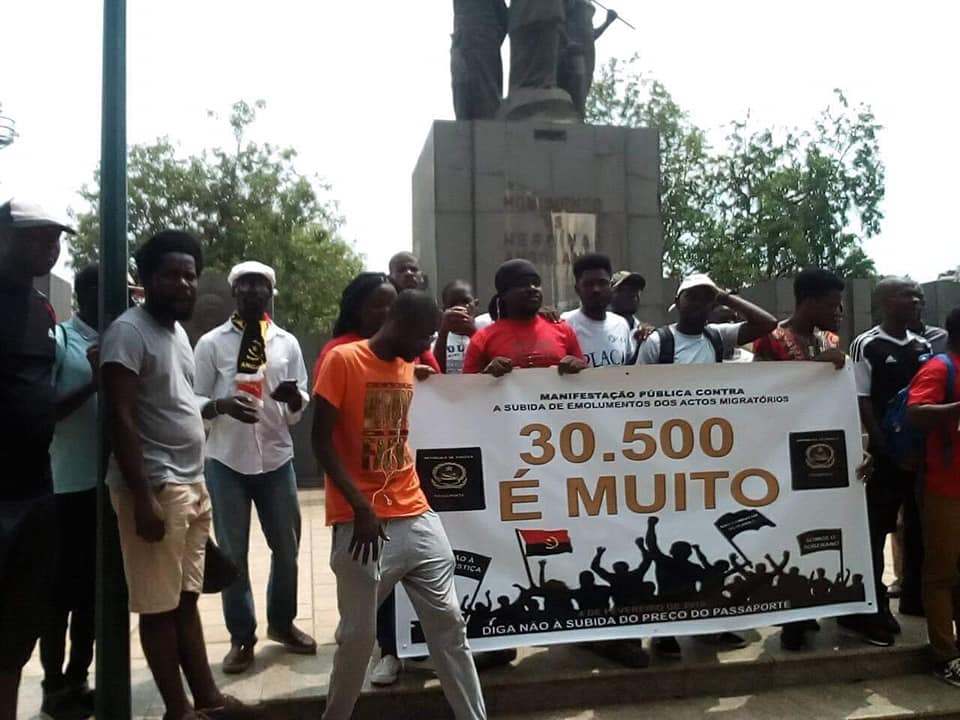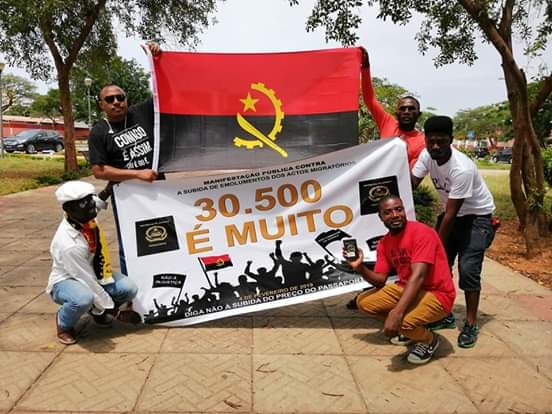
At a protest in Luanda, the sign says “30.500 Kwanzas is a lot”. Photo by Fernando Gomes, used with permission.
Angolans are enraged about the government's new passport fee of 30,500 kwanzas (around 97 US dollars), introduced on 21 January. Previously, the fee costed 2500 kwanzas (8 US dollars).
In addition, the government has put in place a new price scale for all types of travel. It states that authorities will charge 45,250 kwanzas for a staying visa; 21,350 for a tourist visa; 36,500 for tourist visas given at the border; 38,125 for extensions of working visas; 15,250 for medical visas; and 30,500 for a permanent residency card.
Valdemar José, spokesperson for the Interior Ministry, told Angola Press that the price rise for ordinary passports was justified by the higher cost of producing the document:
(…) O governo ajustou o valor real do passaporte e deixou de subvencioná-lo, dando, por exemplo, prioridade à questão da água, luz e dos produtos de primeira necessidade. As cédulas para a emissão dos passaportes têm um custo elevado, por causa dos elementos de segurança usados nos documentos e, que até então o Estado subvencionava os custos do mesmo.
(…) The government adjusted the real value of the passport and stopped subsidising it, giving, for example, priority to issues of water, light and products of primary necessity. The materials for producing passports have a higher cost, because of the security features in the documents, which until now the state subsidised.
This is reminiscent of what Mozambicans experienced in late 2018, when the government also decided to increase the fees for legal documents, as well as for driving licenses, by 500 per cent.
The price hike has sparked controversy. A protest by around 100 youths took place on 4 February, and was promoted by a group of citizens who saw the government’s measure as a clear attempt to restrict people’s right to travel.
The protest
On 4 February, Global Voices spoke with Fernando Gomes, an Angolan activist and one of the promoters of the protest, to learn more of the details around the event. He told us:
Essa forma encontrada para apelar a sensibilidade do executivo de João Lourenço, que esta não é a melhor fase para o aumento do preço, pois os cidadãos perderam o poder de compra de forma exponencial. (…) E que a tão aludida diversificação da economia angolana não pode passar exclusivamente pela elevação dos impostos direitos, visto que estes incidem apenas aos cidadãos, a classe política têm vários privilégios, que são custeados pelo cidadão de si já empobrecido”.
This [was the] way found to attract the attention of João Lourenço’s government, that this is not the best time to increase the price, as citizens lose purchasing power in an exponential way. (…) And that the much alluded to “diversification of the Angolan economy” cannot occur exclusively through raising direct taxes, given that they only hit citizens, the political class has various privileges, which are paid for by the already impoverished citizens themselves.
Critics say that it is important to remember that a passport is a citizen’s identity document abroad and, as such, an inescapable necessity for a lot of citizens.
Vamos ficar todo mês de Fevereiro nas ruas da cidade capital, de forma intercalada, dia 4 de Fevereiro foi o arranque das manifestações, mas dia 7 voltaremos às ruas, e novamente estaremos no dia 11 e dia 13 faremos uma reunião de balanço, caso não haja recuo do executivo na aplicação do decreto presidencial.
We are going to be in the capital city’s streets for the whole month of February, on staggered days, 4 February was the beginning of the demonstrations, but on the 7th we will return to the streets, and again we will be there on the 11th and on the 13th we will hold a debriefing, if the government does not backtrack on the implementation of the presidential decree.
Two young rappers, Lilo Kwanza and Adérito Gonçalves, made a song and video about this protest movement, with the title “Passport for 30 thousand”, ironically commenting on the costs of the document to citizens.
Days before the demonstration, the Angolan activist Pedrowski Teca said that the passport is more important than the identity card, asking people to join the protest:
Manifestação Internacional contra a subida absurda do preço dos Actos Migratórios.
OBS: O Bilhete de Identidade (B.I) só identifica o angolano dentro do território nacional. Fora de Angola, o B.I é inútil, pois o único documento de identificação válido é o passaporte.
Nós, dentro do país, vamos protestar e incentivamos os nossos compatriotas na diáspora a seguirem o mesmo caminho, pois o passaporte é mais útil para eles.
International demonstration against the absurd rise in the prices in Migration Acts.
OBS: The identity card (B.I) only identifies an Angolan within national territory. Outside Angola, the identity card is useless, as the only valid identification document is a passport.
We, inside the country, are going to protect and call on our compatriots in the diaspora to follow the same path, as the passport is more useful for them.
To amplify the message, the activist and university student, David Mendes, wrote, on the day of the demonstration, a message for the Angolan president João Lourenço:
Camarada presidente João Lourenço não foi pra isso que o povo angolano votou para o senhor em momento algum nas suas campanhas o senhor falou sobre a mudança de preços acerca dos documentos afinal de contas o quê que o senhor está pensar?
Onde é que fica a voz do povo? Já temos uma vida miserável com estás subidas de preçário o senhor tem noção da dificuldade que estás a criar neste povo? Sinceramente já não sabemos quem é o homem certo para governar a nossa Angola como é que fica o jovem que não tem um emprego de onde ele vai tirar o dinheiro para tratar os documentos?
Comrade president João Lourenço, it was not for this that the Angolan people voted for you, in no moment of your campaigns did you spoke about a change of price of document, after all what are you thinking?
Where is the voice of the people? We already have a miserable life with these price rises, do you have an idea of the difficulty that you are causing for the people? We sincerely do not know who is the right man to govern our Angola, how will a youth who has no job find the money to get the documents?
So far, the government has not reacted publicly, nor announced if it would consider reducing the price of passport.







